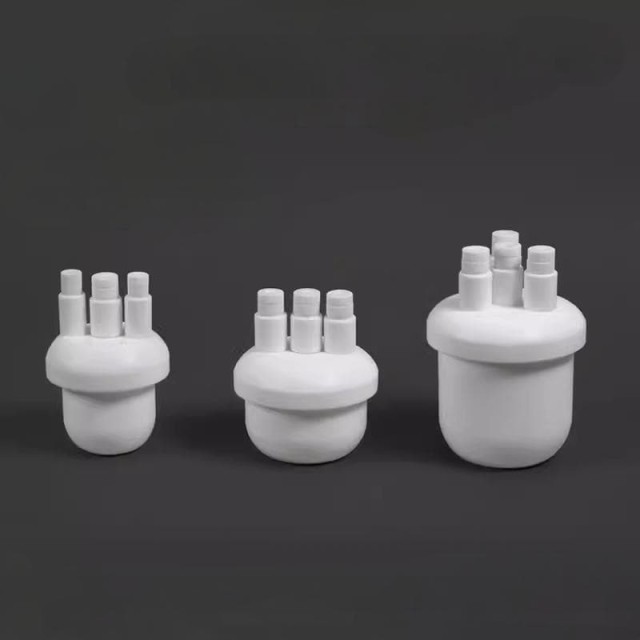
PTFE material
Custom PTFE Teflon Parts Manufacturer for Three-Necked Round Bottom Flask
Item Number : PTFE-36
Price varies based on specs and customizations
- Material
- PTFE
- Specification
- See the form
Shipping:
Contact us to get shipping details Enjoy On-time Dispatch Guarantee.
Why Choose Us
Easy ordering process, quality products, and dedicated support for your business success.
Applications
The PTFE Flask (three-necked bottle) is a versatile laboratory tool designed for various applications due to its chemical resistance, temperature tolerance, and inert properties. Here are the main application areas:
- Chemical Synthesis: Ideal for reactions involving corrosive substances, where the inertness of PTFE prevents any chemical interaction with the flask.
- Environmental Testing: Suitable for handling samples in environmental analysis, especially where the sample may contain aggressive chemicals.
- Heat Treatment: Capable of withstanding temperatures from -200°C to +250°C, making it suitable for heat treatment of samples.
- Laboratory Scale Distillation and Evaporation: The three-necked design allows for multiple attachments, making it perfect for distillation setups and rotary evaporation processes.
Details & Parts
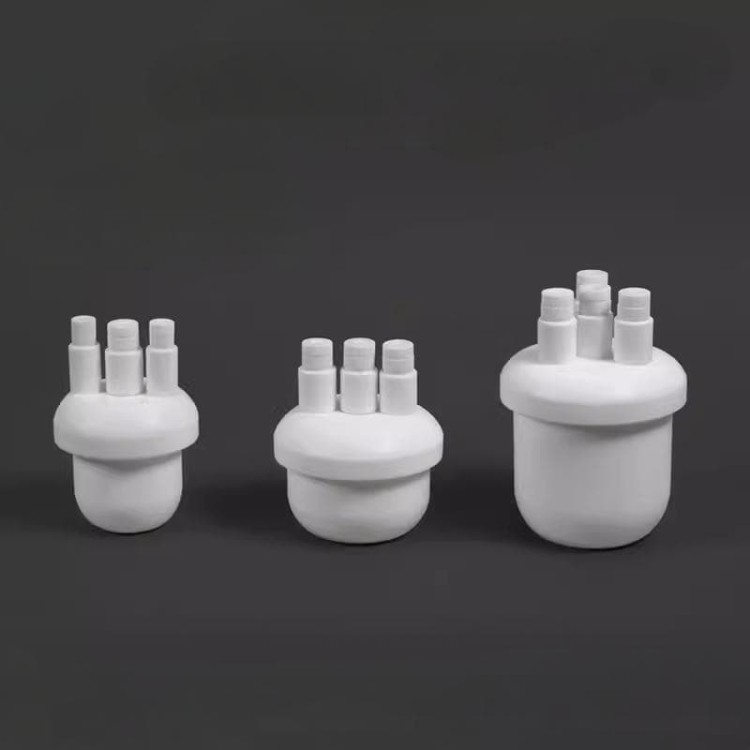
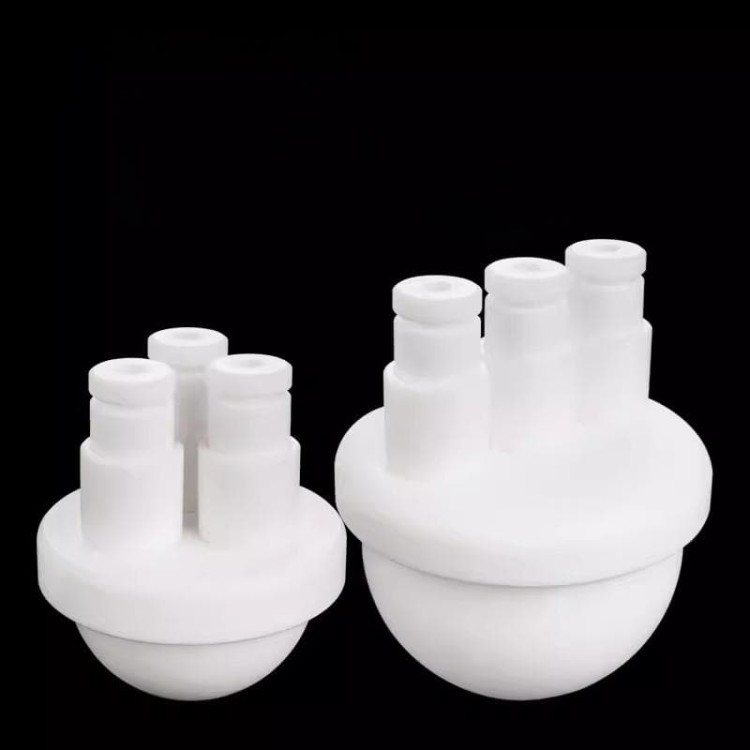
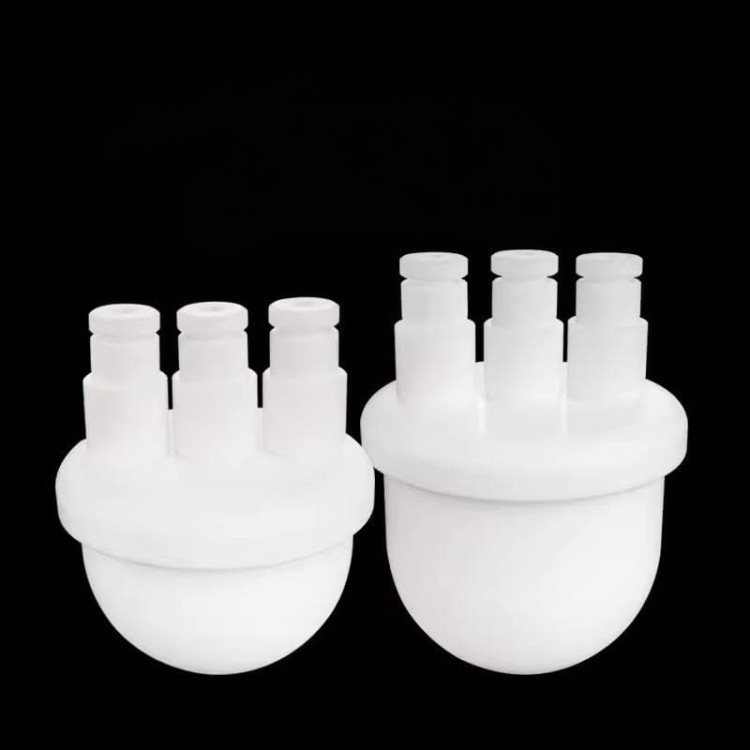
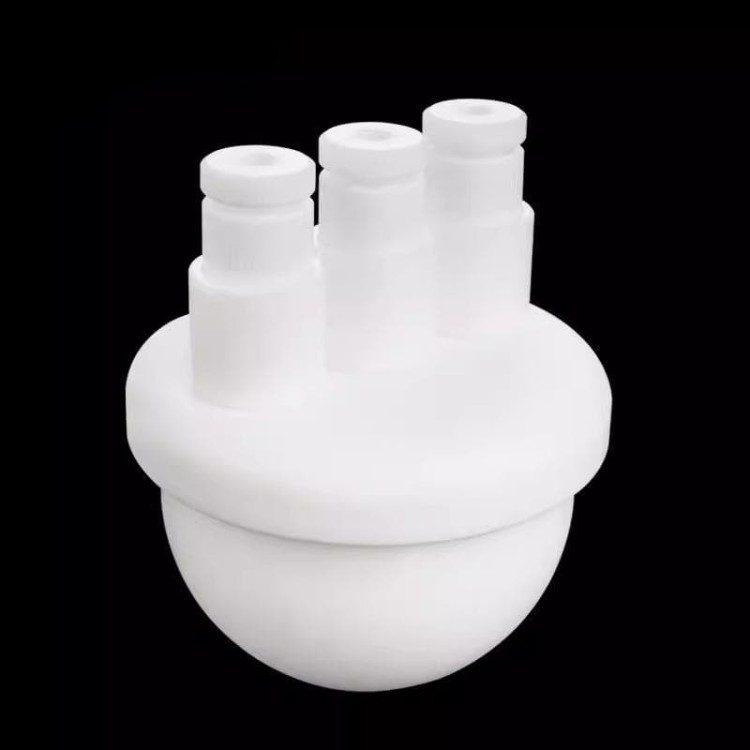
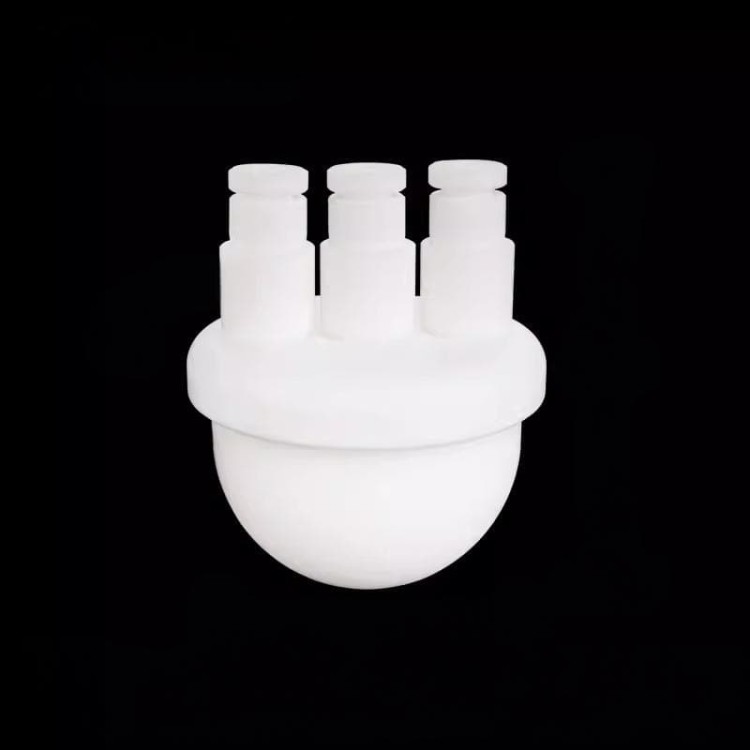
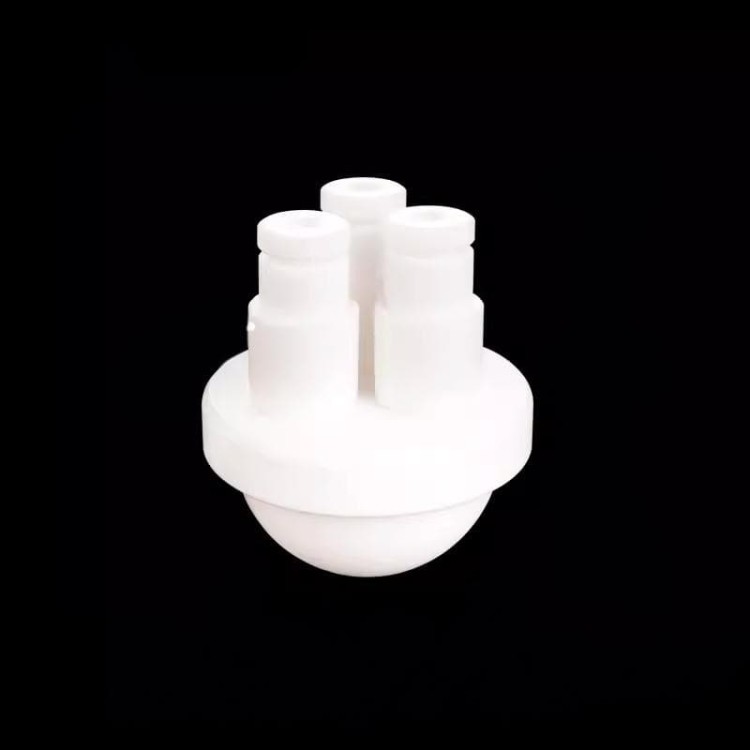
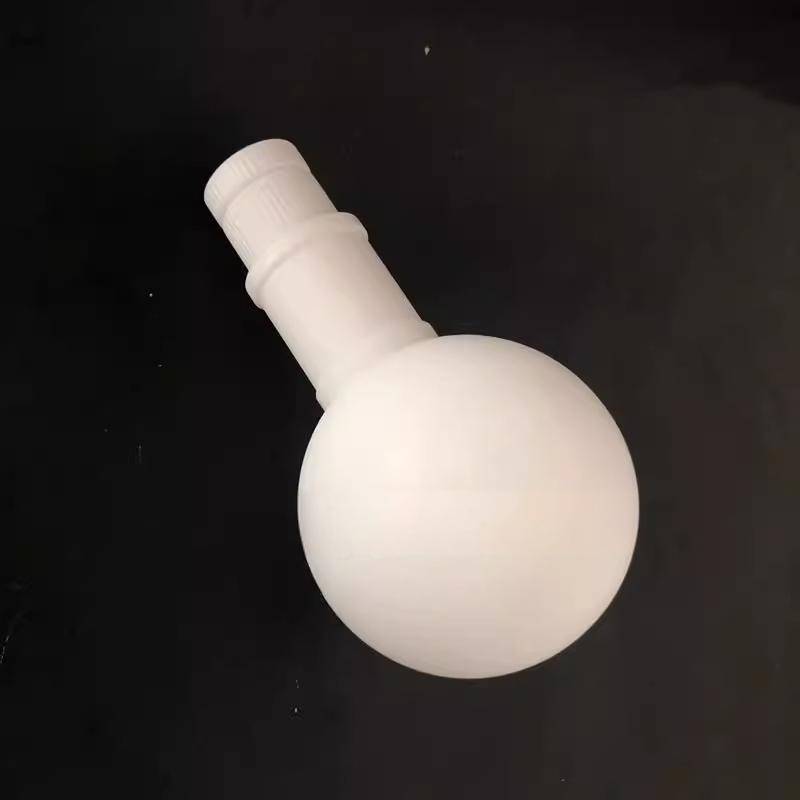
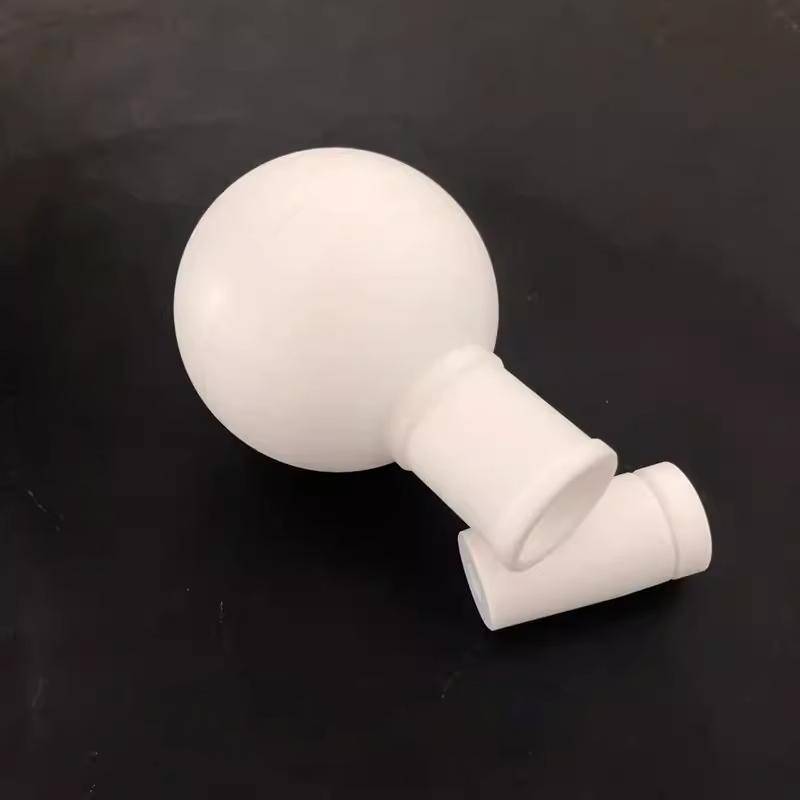
Advantages
The PTFE three-necked bottle, offers a range of advantages that make it a superior choice for various laboratory applications. Here are some of the key benefits:
- Excellent Chemical Resistance: These flasks are extremely inert and resistant to a wide range of chemicals, including corrosive substances like hydrofluoric acid. This makes them ideal for handling aggressive reagents without the fear of contamination or damage to the flask.
- Durability and Safety: Unlike glass, PTFE flasks are unbreakable, reducing the risk of injury and contamination from glass shards. They are also lightweight, making them safer and easier to handle, especially in busy laboratory environments.
- Low Coefficient of Friction and Lubricity: The surface of PTFE flasks is naturally smooth and non-stick, which aids in easy pouring and cleaning. This also minimizes the adhesion of substances to the flask, ensuring accurate measurements and reducing the risk of cross-contamination.
- Temperature Resistance: With the ability to withstand temperatures from -200ºC to +250ºC, these flasks are incredibly versatile and can be used in a wide range of heating and cooling processes without degradation.
Designed for You
KinTek provide deep custom made service and equipment to worldwide customers, our specialized teamwork and rich experienced engineers are capable to undertake the custom tailoring hardware and software equipment requirements, and help our customer to build up the exclusive and personalized equipment and solution!
Would you please drop your ideas to us, our engineers are ready for you now!
Trusted by Industry Leaders

FAQ
How Should PTFE Round-bottomed Flasks Be Heated?
What Are The Advantages Of Using A PTFE Volumetric Flask Over Glass Or PP Flasks?
4.7 / 5
Impressive durability and chemical resistance, a must-have for any lab.
4.8 / 5
Unbeatable value for money, this flask has transformed our lab processes.
4.9 / 5
Lightweight yet robust, perfect for high-temperature experiments.
4.7 / 5
Excellent chemical compatibility, no issues with aggressive reagents.
4.8 / 5
Super easy to clean and maintain, saves so much time.
4.9 / 5
Highly satisfied with the temperature resistance, reliable in every test.
4.7 / 5
Great investment for our lab, durable and cost-effective.
4.8 / 5
The non-stick surface is a game-changer, no more stubborn residues.
4.9 / 5
Perfect for volumetric analysis, precise and consistent results.
4.7 / 5
Excellent dielectric properties, ideal for our electrical experiments.
4.8 / 5
Versatile and sturdy, handles all our lab needs with ease.
REQUEST A QUOTE
Our professional team will reply to you within one business day. Please feel free to contact us!
Related Products
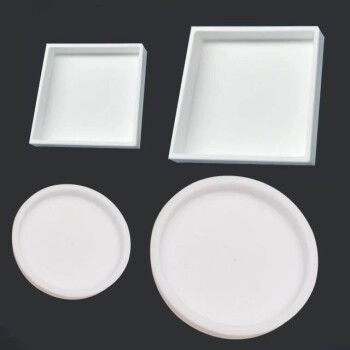
Custom PTFE Teflon Parts Manufacturer for PTFE Containers
PTFE container is a container with excellent corrosion resistance and chemical inertness.

Custom PTFE Teflon Parts Manufacturer for PTFE Measuring Cylinder 10/50/100ml
PTFE measuring cylinder are a rugged alternative to traditional glass cylinders. They are chemically inert over a wide temperature range (up to 260º C), have excellent corrosion resistance and maintain a low coefficient of friction, ensuring ease of use and cleaning.
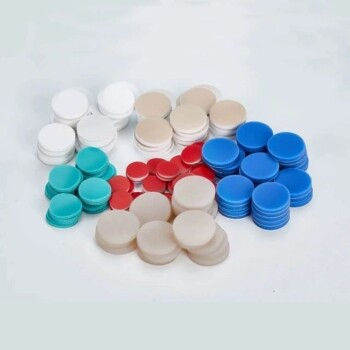
Custom PTFE Teflon Parts Manufacturer for Gaskets and More
Gaskets are materials placed between two flat surfaces to enhance the seal. To prevent fluid leakage, sealing elements are arranged between static sealing surfaces.
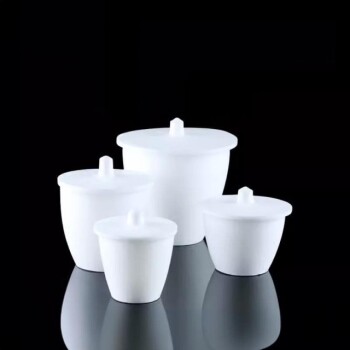
Custom Machined and Molded PTFE Teflon Parts Manufacturer with PTFE Crucible and Lid
PTFE crucibles, made from pure Teflon, offer chemical inertness and resistance from -196°C to 280°C, ensuring compatibility with a wide range of temperatures and chemicals. These crucibles feature machine-finished surfaces for easy cleaning and prevention of contamination, making them ideal for precise laboratory applications.

Custom PTFE Teflon Parts Manufacturer for PTFE Tweezers
PTFE tweezers inherit the excellent physical and chemical properties of PTFE, such as high temperature resistance, cold resistance, acid and alkali resistance, and corrosion resistance to most organic solvents.
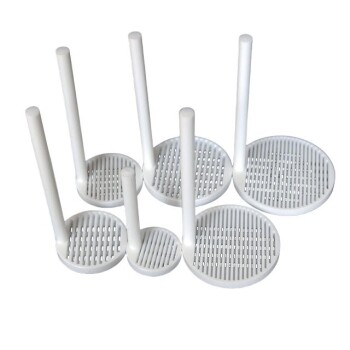
Custom PTFE Teflon Parts Manufacturer for Cleaning Racks
PTFE cleaning racks are mainly made of tetrafluoroethylene. PTFE, known as the "King of Plastics", is a polymer compound made of tetrafluoroethylene.

Custom PTFE Teflon Parts Manufacturer PTFE Beaker and Lids
The PTFE beaker is a laboratory container that is resistant to acid, alkali, high and low temperatures and is suitable for temperatures ranging from -200ºC to +250ºC. This beaker has excellent chemical stability and is widely used for heat treatment samples and volume analysis.
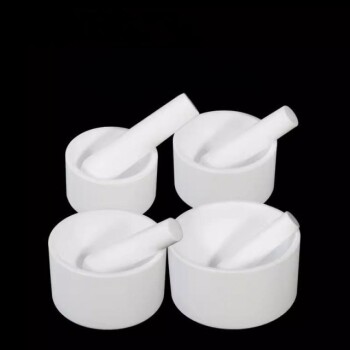
Custom PTFE Teflon Parts Manufacturer Grinding Bowl
PTFE is renowned for its exceptional chemical resistance, thermal stability, and low friction properties, making it a versatile material in various industries. The PTFE grinding bowl, specifically, finds applications where these properties are crucial.

Custom PTFE Teflon Parts Manufacturer F4 Conical Flask Triangular Flask 50 100 250ml
The PTFE triangular flask, also known as a Teflon reagent bottle, is a robust, chemical-resistant alternative to traditional glass bottles, suitable for handling both acids and alkalis. These bottles are unbreakable, lightweight, and feature a leak-proof screw cap, making them ideal for laboratory use.
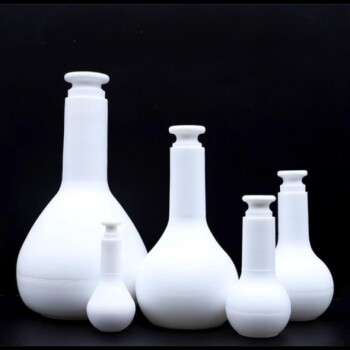
Custom PTFE Teflon Parts Manufacturer for F4 PTFE Volumetric Bottle
The PTFE Volumetric Flask, a robust alternative to glass and PP flasks, excels in measuring both acidic and alkaline liquids. Characterized by its chemical inertness, translucency, and wide volume options, this flask ensures a non-leachable, ultra-clean background. Its non-stick surface simplifies cleaning and maintenance, making it ideal for harsh laboratory conditions.
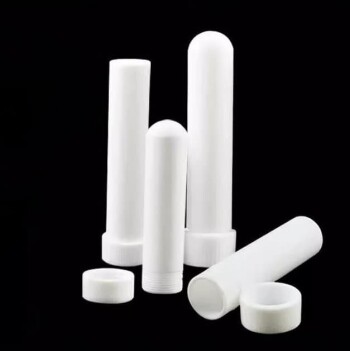
Custom PTFE Teflon Parts Manufacturer for Centrifuge Tubes
PTFE centrifugal tubes are highly valued for their exceptional chemical resistance, thermal stability, and non-stick properties, making them indispensable in various high-demand sectors. These tubes are particularly useful in environments where exposure to corrosive substances, high temperatures, or stringent cleanliness requirements are prevalent.
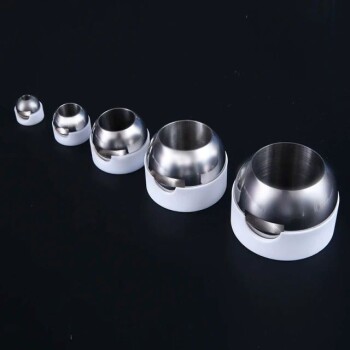
Custom PTFE Teflon Parts Manufacturer for PTFE Ball Valve Seat
Seats and inserts are vital components in the valve industry. As a key component, polytetrafluoroethylene is usually selected as the raw material.

Custom PTFE Teflon Parts Manufacturer for PTFE Buchner Funnel and Triangular Funnel
The PTFE funnel is a piece of laboratory equipment used primarily for filtration processes, particularly in the separation of solid and liquid phases in a mixture. This setup allows for efficient and rapid filtration, making it indispensable in various chemical and biological applications.
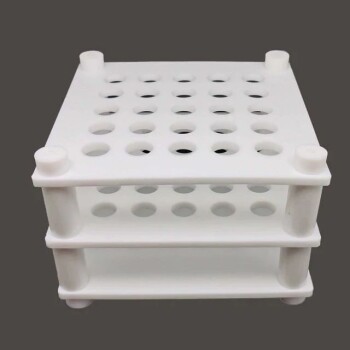
Custom PTFE Teflon Parts Manufacturer for Centrifuge Tube Racks
The precision-made PTFE test tube racks are completely inert and, due to the high temperature properties of PTFE, these test tube racks can be sterilized (autoclaved) without any problems.
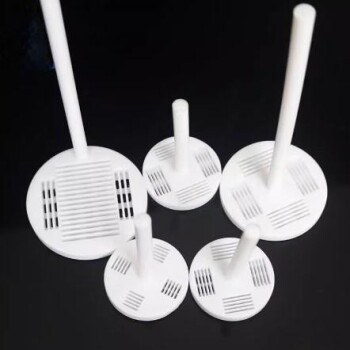
Custom Machined and Molded PTFE Teflon Parts Manufacturer for Laboratory ITO FTO Conductive Glass Cleaning Flower Basket
PTFE cleaning racks are mainly made of tetrafluoroethylene. PTFE, known as the "King of Plastics", is a polymer compound made of tetrafluoroethylene.
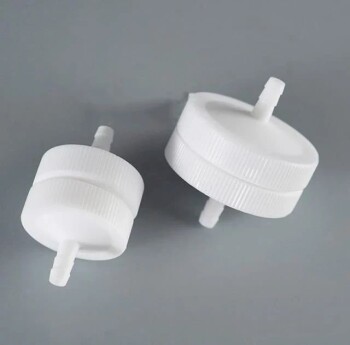
Custom PTFE Teflon Parts Manufacturer for Sampling Filters
PTFE filter element is a commonly used industrial filter element, mainly used to filter corrosive media such as high-purity chemical substances, strong acids, and strong alkalis.
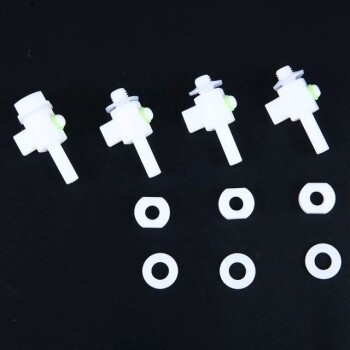
Custom PTFE Teflon Parts Manufacturer for Air Valve Applications
PTFE small air valve for gas-liquid sampling and sampling bag for sample collection.

Custom PTFE Teflon Parts Manufacturer for Culture Dish and Evaporation Dish
The PTFE culture dish evaporating dish is a versatile laboratory tool known for its chemical resistance and high-temperature stability. PTFE, a fluoropolymer, offers exceptional non-stick properties and durability, making it ideal for various applications in research and industry, including filtration, pyrolysis, and membrane technology.
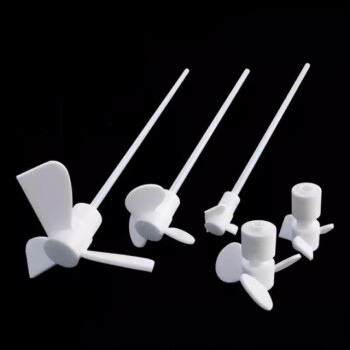
Custom PTFE Teflon Parts Manufacturer Laboratory High Temperature Mixing Paddle Mixer
The PTFE mixing paddle mixer is a versatile and robust tool designed for laboratory use, particularly in environments requiring high resistance to chemicals and extreme temperatures. Crafted from high-quality PTFE, this mixer boasts several key features that enhance its functionality and durability.
Related Articles

Manual Hydraulic Presses for Laboratory Use: A Comprehensive Guide
Explore the intricacies of manual hydraulic presses in labs, including operation, benefits, and comparison with automatic models. Ideal for those seeking detailed insights on sample preparation and cost-effectiveness.

Common Instrumentation and Operations in Organic Synthesis
Overview of essential glass apparatus, distillation setups, recrystallization, and extraction methods in organic synthesis.

Chemical Vapor Deposition (CVD) Process and High Purity PFA Tubing
An overview of the CVD process and the role of high purity PFA tubing in semiconductor manufacturing.

PTFE seals: the invisible guardian of industrial leakage prevention
PTFE Seals are used to prevent liquid or gas leakage and are widely used in valves, pumps, and piping systems.

Performance and application of polytetrafluoroethylene (PTFE) in high temperature environment

Sample Preparation Guidelines for Various Analytical Instruments
Detailed instructions for preparing samples for NMR, MS, Chromatography, IR, UV, ICP, Thermogravimetric, XRD, TEM, SEM, and other instruments.

Application of Molecular Distillation Technology in Daily-Use Chemical Industry
Exploring the use of molecular distillation in enhancing the quality and purity of daily chemical products.

Solutions for Removing a Stuck Spatter Ball from a Rotary Evaporator
Guidelines and techniques for removing a stuck spatter ball from a rotary evaporator, including shaking, knocking, baking, freezing, and smashing.

The Vessel of Truth: Why the Container Matters More Than the Chemistry
The success of an electrolytic experiment often hangs on the material of the cell body. Discover the trade-offs between Borosilicate, Quartz, and PTFE.

Polytetrafluoroethylene (PTFE): How low friction coefficient promotes industrial progress
Explore the unique advantages of polytetrafluoroethylene (PTFE)'s low coefficient of friction and analyze how it promotes progress and innovation in industrial technology in terms of reducing wear and improving equipment efficiency.

How to use PTFE to improve the working efficiency of pumps and valves
Polytetrafluoroethylene (PTFE) has become a key material for improving the efficiency of pumps and valves due to its unique physical and chemical properties.

Understanding Optical Filters
An overview of optical filters, their types, and applications.